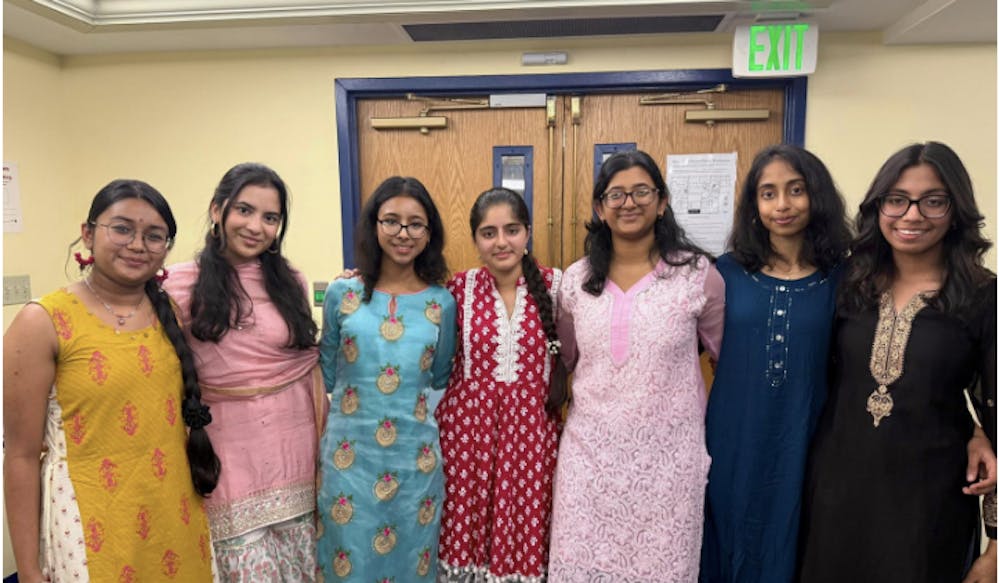
My phone buzzed with a reminder from my mom: “Aaj Diwali hai, haath jodh lena.” I looked around my sparse dorm — the string lights I’d never hung, two Bhagwaanji in the corner — and slipped out before the silence could settle.
Last year, Diwali had fallen on November 1st — the day early college applications were due. I’d spent it hunched over my Common App, cranky and sleep-deprived, surrounded by snacks I didn’t have time to eat and decorations outside my door I didn’t have time to notice. I’d promised myself I would celebrate properly next year. I hadn’t realized that “next year” would mean being hundreds of miles away, with no diyas to light or pooja to dress up for.
This year, Diwali passed like any other day: one “Happy Diwali!” from a friend before my FBBC lecture — then silence. That night, my parents FaceTimed me from home, their faces golden from the light of 21 diyas. “We did your part for you,” my mom said cheerfully, angling the camera to show every corner of the altar. I smiled back, but when the call blinked out, the gap between us felt a little wider and darker and my chest a little more hollow.
The hollowness lingered as I explained Diwali to my roommate. I described the countertops crowded with my mom’s cooking, garlands trailing down the staircase and the faint sandalwood scent that clung to our walls for days. I told her about the rangoli we would dance around for weeks to reach the front door and how my brother and I would giggle through the entire pooja. Afterward, I would chase my dad around the house deciding where each diya should go: one by the TV, one on my nightstand, two on my desk so the place I studied would feel extra special. I’d fall asleep watching the flames flicker and wake up to find them all gone.
It’s funny how much I craved belonging to an identity that had always been in the background of my life. Coming to college, I’d worried I wouldn’t be “Indian enough” for Hopkins’s effortlessly proud, close-knit Desi community. I loved the clothes but never quite knew how to drape my dupatta over my lehenga. Yeh Jawaani Hai Deewani with a bowl of ice cream is my comfort movie, but I don’t know the new Hindi party songs. I don’t even like gujiya that much and pooja had always been a five-minute task before I ran out to catch the bus.
Yet, waking up to no decorations, no steaming food, no acknowledgement of the day except for a calendar notification reminded me exactly what I was missing. So when a friend made a group chat about hosting our own Diwali party, the jolt of excitement that shot through me made it clear — I wasn’t going to miss it.
The next evening, we took over the McCoy lounge. I changed into a bright green kurta and went downstairs to find a mismatched crowd — some in kurtas and lehengas, others in hoodies and jeans. We scavenged tealight candles from CVS and lined them on a paper plate; someone else brought Lays and a box of laddoo for prasad. There was chocolate ice cream, plastic spoons, Kurkure and Takis. Each new arrival was met with cheers, our group swelling from five to 20 in an hour, the awkwardness dissolving into an easy warmth.
When it was time for the aarti, I sprinted back to my room for my Bhagwanji figures so our setup could resemble a mandir at home. We took off our shoes and formed a circle, fumbling through the words and gestures, doing as much as memory allowed. Someone pulled up a “Ganesha Aarti” video on YouTube, and as the plate passed to me, a girl asked how many circles I usually complete. “Just until I feel like it, then I give it to my mom,” I shrugged. She laughed, “Pretty sure it’s supposed to be seven.” No judgment in her voice — just familiarity that made it all make sense. For a second, it felt like home.
Then someone connected a Hopkins Bluetooth speaker to Spotify, and our solemnity dissolved into chaos. Soon we were dancing in our socks to Bollywood, our iPhone flashlights replacing diyas we couldn’t light. It was a Diwali unlike any I’d known — imperfect, improvised, but unmistakably ours.
Looking around at our impromptu and day-late Diwali celebration, I began to understand how growing up doesn’t have to mean leaving home behind. It means learning how to rebuild it wherever you go, translating rituals instead of replacing them. This Diwali was proof that the things I love can survive distance even if they look and sound different here. One day, I’ll have my own apartment in some city, my own home to light — or not light — for Diwali. The thought feels both thrilling and terrifying: to know that what survives of tradition will be what I decide to keep alive.
Returning to my organic chemistry textbook two hours later, my world felt brighter and my life a little more full for the first time in weeks. We hadn’t recreated home perfectly, but somewhere between midterms and a Tuesday night GBM, we had all at least tried. We managed to remake belonging from what remained, with whoever showed up.
Vidhi Bansal is a freshman from Upper Saddle River, N.J., studying Neuroscience and Computational Medicine.





